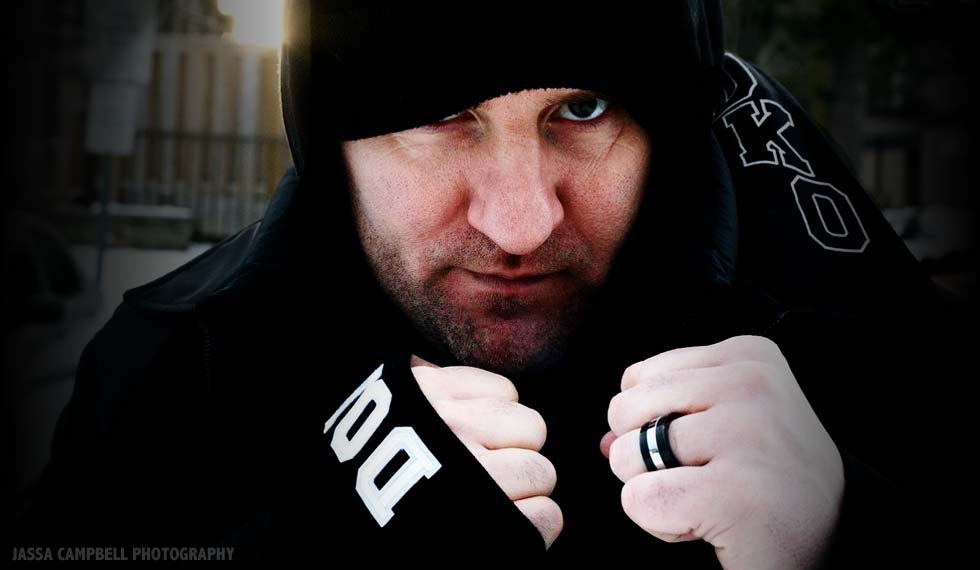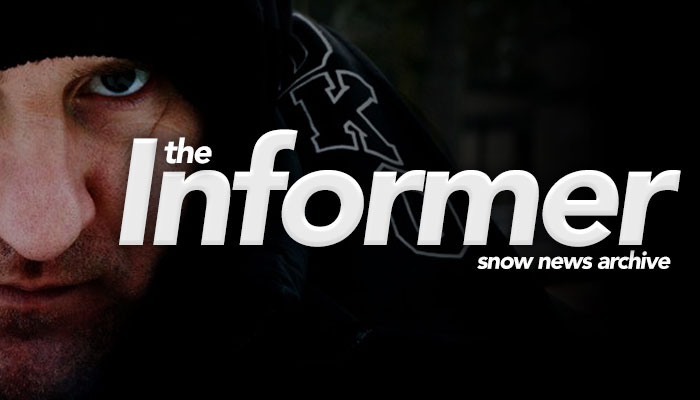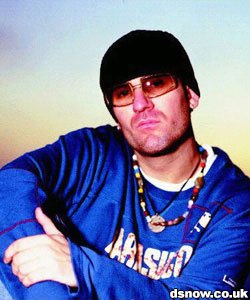 Somehow it all seems to suggest things are more complex than they seem. Racial profiling, a season of street violence in Toronto, and the usual innuendoes that Jamaicans brandish the most weapons all become slightly more confusing for those seeking easy explanations. How? Just add Snow.
Somehow it all seems to suggest things are more complex than they seem. Racial profiling, a season of street violence in Toronto, and the usual innuendoes that Jamaicans brandish the most weapons all become slightly more confusing for those seeking easy explanations. How? Just add Snow.
Born Darrin O’Brien in 1969, Snow grew up in North York’s Allenbury Projects, a place where the dreams of recent immigrants and old school Canadians square off against the often harsh realities of the city’s subsidized housing scene. It’s a place that, according to Snow, has changed dramatically over the past twenty years.
‘When I was growing up I didn’t know people who would break into people’s houses and steal their wedding bands,’ he says. ‘My neighborhood was a place where you’d see a lady come walking by with her purse and her groceries in her hand and somebody run up to her, grab the groceries and help her across the street and bring it to her house.’
Regardless of geography, this is but one tale from a city that’s currently embroiled in a rush of reminiscence about the good old days. From Allenbury to Cabbagetown to Eglinton West, people across Toronto can be heard talking about the 1970s like it was some kind of golden age. Listen to anyone over thirty and pay attention to that far away look in their eyes as they talk with this myth-like reverence about life before the sweep of crime, poverty, and social suffering.
Leaving the blame game or even the criminal sociology to the pundits and the pros -who finger everything from immigration to gang infiltration to crack cocaine to Mike Harris’ attack on social welfare – streets know that whatever upped the badman ante in Toronto hit families across the board. Snow knows that because if anyone’s looking for the poster boy for old-school Irish-Canadian crime, he’s your thug.
‘I’ve been street all my life,’ he says. ‘I’m real, real, real street. All the way to the parents, to the grandparents. My whole neighborhood has been in jail or mixed up. But I don’t run around like I’m a badman! When I’d been in jail and came out, I told the people that I’d been in jail. Not for the fact that I wanted it to be street credibility, just for the fact that I’ve been there.’
Having spent eighteen months in Metro East Detention Centre on murder charges from which he was later aquitted, Snow’s rap sheet (beyond the music) is long enough that he doesn’t need a publicist to cook up the usual street rapper bio to score him points in a market still largely cornered by gangster icons. From brawling in bars, assaults, uttering death threats, and other pleasantries, Snow’s criminal history is long enough that he’s been banned from not only from establishments across Toronto but also from Japan and the United States. Plus, he’s been chased out of Thailand once. In every case, he says, his violent streak came out of a bottle, something he finally had to face during one in a series of court appearances.
‘One judge called me and all my friends scumbags, lowlife pieces of garbage, and all this stuff,’ he explains. ‘This was five years ago, exactly the day I stopped drinking. That was really inspiring, make we want to go out and stop drinking. I had two charges, one two weeks before the last charge. Then, when he knew I tried to help my mother, tried to help my father when they divorced, the next judge is telling me all these good things like ‘You got a big heart and you’re kind’. I’m like, maybe I should just give up this alcohol and get back on track with my life cause I’m going down the hill drinking and going to jail and doing stupidness. I give it up, I quit, and I felt better. And my dad been tryin’ to get me to quit cause he used to be drinking and fighting and going to jail and stuff. He was trying to tell me quit the alcohol. I should have listened to him, like we always should listen to our parents. I haven’t touched a drink in five years and never will again.’
Today, with the release of his latest disc, Two Hands Clapping, Snow says he’s a quiet, shy, and humble person. He’s not into the gun talk. He doesn’t subscribe to the bling bling culture. He’s more about Kraft dinner than living the high life. And he’s fixed on spreading a positive message to his listeners. But even with his checked past largely behind him and a commitment to living on the straight and narrow for his daughter Justuss (for whom his 1997 album is titled), he says he has few, if any, regrets about the time served.
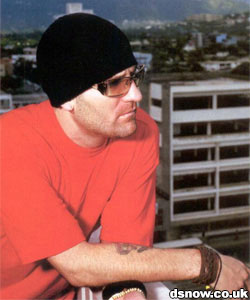 ‘I should be saying that I regret going to jail but I can’t,’ he says.’I wrote ‘Informer’ and got the confidence singing in jail in front of murderers. Eighteen years old, up for two attempted murders, myself. I’m on a range with pure murderers. I’m not on no petty range downstairs, or the third floor, or the fourth floor. I’m on the fifth floor with big timers rocking the jailhouse! When Elvis Presley said ‘rock, the jailhouse rock,’ he sang about it. I did it! I went in there. Ranges would be calling for me, ‘Snow! Come and sing on this range, on this range, on this range,’ while I was walking past the ranges. I said, ‘No I can’t because my father, my brother, my uncle and my other uncles and my best friend are over on this range’. On one range: me, my brother, my step-father, my uncle Paddy, my uncle Terry, my best friend Inchie, my other good friend Billy. The whole range was family. I don’t regret that because I wrote in there and I came out and I learned and brought reggae music to people that never heard it.’
‘I should be saying that I regret going to jail but I can’t,’ he says.’I wrote ‘Informer’ and got the confidence singing in jail in front of murderers. Eighteen years old, up for two attempted murders, myself. I’m on a range with pure murderers. I’m not on no petty range downstairs, or the third floor, or the fourth floor. I’m on the fifth floor with big timers rocking the jailhouse! When Elvis Presley said ‘rock, the jailhouse rock,’ he sang about it. I did it! I went in there. Ranges would be calling for me, ‘Snow! Come and sing on this range, on this range, on this range,’ while I was walking past the ranges. I said, ‘No I can’t because my father, my brother, my uncle and my other uncles and my best friend are over on this range’. On one range: me, my brother, my step-father, my uncle Paddy, my uncle Terry, my best friend Inchie, my other good friend Billy. The whole range was family. I don’t regret that because I wrote in there and I came out and I learned and brought reggae music to people that never heard it.’
People like the most unlikely of demographics for reggae.
‘I’m the only guy who could sing reggae in a clubhouse,’ he says, referring to performances at Hell’s Angels parties. ‘Like get up on the stage while all these bikers are there and start signing reggae and they’re dancing to it. Or have (friend) Too Tall on one of the president’s boats. On this big boat, a brother! They’re good people, they’re legit. They do some good things, which people don’t think about. They do some good organizations and they come from the heart.’
While this opinion might not sit well with folks like Mayor Mel Lastman, whose hand-shaking brush with the Angels landed him in hot media water a while back, for Snow it’s all part of a street culture branded with loyalty.
‘I hate shape shifters,’ he explains. ‘I call fake people shape shifters. I love people that I know all my life. They have never shape shifted on me. I just don’t like the people that act like this. Like Deane Cameron, the President of EMI Canada, I don’t care what he does. I don’t care if he’s the President or not, I’m gonna come to him if I like him and shake his hand and treat him like I don’t know who he is. I don’t like the people that shake their hand and say ‘Oh, you’re the President’ and give them more love than they gave this person over here. I don’t like shape-shifters.’
Even with love for the notorious crews he grew up around, Snow does have his regrets about his criminal past and begs fans not to follow in his footsteps.
‘Don’t go there,’ he says. ‘It’s not a place to go. Don’t go on like you’re bad and this. If you got to do, do your thing. But try not to get mixed up in that stuff it you don’t have to. Some people have to and that’s just the world. But I regret all the assaults. I regret the alcohol drinking. If I didn’t drink the alcohol and just burned the weed from that time I would have been wickeder. But I wouldn’t have wrote ‘Informer,’ I wouldn’t went to jail, and this wouldn’t happen. That’s how it goes.’
And go it did. After the much told story of linking with MC Shan in New York, Snow released his debut album, 12 Inches of Snow, back in 1993 and the lead single, ‘Informer’, was such a massive international hit that it made the Guiness Book of World Records twice – once as the highest selling reggae single in the U.S. (where it charted at #1), and once as the highest charting reggae single in the U.K. (where it reached #2). The next decade saw him release a series of albums, tour the globe, cop some Juno nods, guest star on albums from Maestro, David Usher, Sum 41, Treble Charger, and Ghetto Concept, and appear as a Prison Guard in Robert DeNiro’s directorial feature Prison Song, for which he got his Uncle Paddy’s permission – important, considering the man had spent twenty-six years locked up.
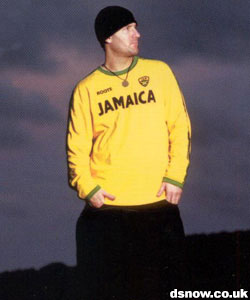 But it was his first trip to Jamaica and studio work with dancehall luminaries Beenie Man, Buju Banton, Terror Fabulous, Louie Culture, and Nadine Sutherland on ‘Anything For You’ (from 1995’s Murder Love album) that firmly placed him in the musical culture he’d been fixated on since the age of fourteen. Back in the Vanier High School days when he was listening to dancehall tapes from yard, selling weed in hot boots, and cruising around the Peanut Plaza on a mountain bike decorated with Haile Selassie stickers, Snow’s only dream was of making it in the reggae business and following in the footsteps of major influences like Nitty Gritty, Tenor Saw, Michael Rose, and Junior Reid. Why?
But it was his first trip to Jamaica and studio work with dancehall luminaries Beenie Man, Buju Banton, Terror Fabulous, Louie Culture, and Nadine Sutherland on ‘Anything For You’ (from 1995’s Murder Love album) that firmly placed him in the musical culture he’d been fixated on since the age of fourteen. Back in the Vanier High School days when he was listening to dancehall tapes from yard, selling weed in hot boots, and cruising around the Peanut Plaza on a mountain bike decorated with Haile Selassie stickers, Snow’s only dream was of making it in the reggae business and following in the footsteps of major influences like Nitty Gritty, Tenor Saw, Michael Rose, and Junior Reid. Why?
‘Cause I got nothing else to do,’ he says, echoing a long tradition in Kingston dancehall culture telling youths that music is the only way out. ‘I can’t work so it’s just music that I got to do.’
Earlier in his career, performing music derived from black Jamaican culture brought the usual round of criticisms. From 80s dancehall DJ Dominik to the rise of Eminem, it’s a well worn story. And while amateur linguists tried to prove the inauthenticity of his Jamaican patois, most people seemed to miss the point. Snow wasn’t modeling Kingston culture. He was reppin’ his Allenbury roots. Even more confusing for those who thought they’d pegged him were recent twists and turns, especially on 2000’s Mind On The Moon CD, where he went into full pop mode. From his recent vocal drop on Ghetto Concept’s ‘Too Much’ to pushing pure reggae on Two Hands Clapping to threatening a country album, Snow says his mandate’s not about fulfilling expectations. It’s not about, Is he a rapper? Is he a DJ? Is he a singer? Or is he a singjay? It’s about reaching out to listeners.
‘It’s just when I see a fan,’ he says. ‘One time I did a show and this guy came up to me and his father just died, and his sister, she took it really hard. But my album got her through that period of time. It’s things like that that people tell me. You don’t really see all the people’s reactions. I don’t see the people in their bedroom playing the song saying ‘Oh, I like this song’. If I did it would make me even more hungrier, more want to do it. It’s things like that that makes me want to put out albums just for them people.’
Considering his impressive record of a decade in and seven albums – including 1997’s The Greatest Hits of Snow – his people are everyone from Jamaica to Japan. It’s a global thing and, while he loves the home turf, he’s having none of the CanCon consciousness that’s being fronted to push up a waning domestic scene.
‘People say to me ‘I respect you cause you’re Canadian’,’ he says. ‘I hate that. I don’t respect or like Canadian artists because they’re from Canada. If they’re Canadian and they’re doing it and they suck, they suck. If they’re good, wicked. I don’t look at it like the Rascalz and them. I don’t look at ‘em like, oh Canadian. I just look at ‘em, okay wicked. They have some wicked tunes and blah blah blah. I look at myself as a world, like if somebody in Africa all the way to Japan can hear my music and enjoy it. That means it’s world.’
Which is why Snow was back in Jamaica this fall promoting his latest release. Produced, in part, by Kingston studio dons Tony and Dave Kelly, it all seems to fit. The place he could only dream about during long nights in prison have become the neighbourhoods he can now travel, soaking in the inspiration from the streets that grew his musical idols and the country that cultured one of popular music’s most enduring legacies. For those seeking simple explanations, it’s far from neat. But Snow’s journey from the range to the stage should make us all look a little more closely at what separates us as people in places. Listen and look. It’s there, somewhere between the dancehall, the cross-Canada tour, or the car radio blasting his tunes on a street corner outside Allenbury Projects or Tivoli Gardens.
